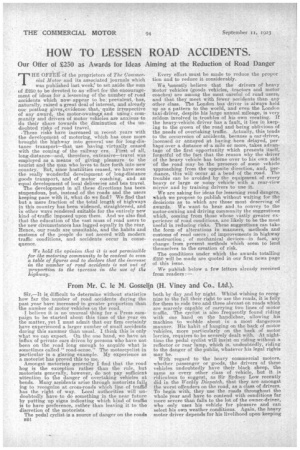HOW TO LESSEN ROAD ACCIDENTS.
Page 10

If you've noticed an error in this article please click here to report it so we can fix it.
Our Offer of £250 as Awards for Ideas Aiming at the Reduction of Road Danger
HE OFFER of the proprietors of The Commer dal Motor and its associated journals which was published last week: to set aside the sum if 2250 to be devoted to aireffort for the encouragement of ideas for a lessening of the number of road accidents which now appear to be: prevalent, has, naturally, raised a great deal of interest, and already our postbag gives, evidenoe that, quite irrespective of any award, the motor-owningY, and using:. cornIn-anity and drivers of motor vehicles are anxious to do their share towards the diminution of the undoubted risks of road travel.
These risk's have increased in recent years with the development of motoring, which has once more brought the highway into general use for long-distance transport-that use having virtually ceased with the coming of the railway era. First of all, long-distance—and, therefore, extensive--travel was employed as a means of giving pleasure to the tourist and the man who loves to fare forth into new country. But, since hostilities ceased, we have seen the really wonderful development of long-distance goods transport, and of motor coaching, and an equal development of local deliveries and bus travel.
The development in all these directions has been stupendous, but, instead of the roads and the users keeping pace with it, what do we find? We find that but a mere fraction of the total length of highways in this country has been widened, straightened, and in other ways rendered suitable for the entirely new kind of traffic imposed upon them. And we also find that the education of the vast mass of road users to the new circumstances has lagged equally in the rear. Hence, our roads a-re unsuitable, and the habits and customs of the people do not accord with modern traffic conditions, and accidents occur in consequence.
We hold the opinion that it is not permissible for the motoring community to be content to scan a table of figures and to declare that the increase lin the number of road accidents is not out of propoNion to the increase in the use of the highway..
Every effort must be made to reduce the propor tion and to reduce it considerably.
We, honestly believe that the drivers of heavy motor vehicles (goods vehicles, tractors and motor coaches) are among the most careful of road userss and that they meet with fewer accidents than 4ny other class. The London bus driver is always held up as a pattern to the world, and even the London taxi-driver, despite his large annual mileage, is very seldom involved in troubles of his own creating. If the heavy-vehicle driver has a fault, it lies in keeping to the crown of the road and being oblivious of the needs of overtaking traffic. Actually, this tends to the occurrence of accidents. because a ear-driver, incensed or annoyed at having been delayed, perhaps over a distance of a mile or more, takes advantage of the first opportunity which presents itself, forgetful of the fact that the reason why the driver of the heavy vehicle has borne over to his own side of the road may be the presence of some vehicle Approaching from the opposite direction, and, peraha,nce, this will occur at a bend of the road. The trouble can he avoided by the equipment of every heavy or large or noisy vehicle with a rear-view mirror and by training drivers to use it.
We are asking for ideas for lessening road dangers, which we propose to publish without waiting for the decisions as to which are those most deserving of awards. We want to hear and to convey to the motor-owning and driving community the suggestions which, coming from those whose vastly greater experience of road conditions, are likely to be the most useful in reducing risks. These suggestions can take the form of alterations in manners, methods and customs of road users ; of improvements in highway construction ; of mechanical devices—in fact, any change from present methods which seem to lend themselves to the creation of risk.
The conditions under which the awards totalling £250 will be made are quoted in our first news page of this issue.
We publish below a few letters already received from readers :—


































